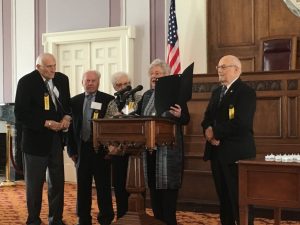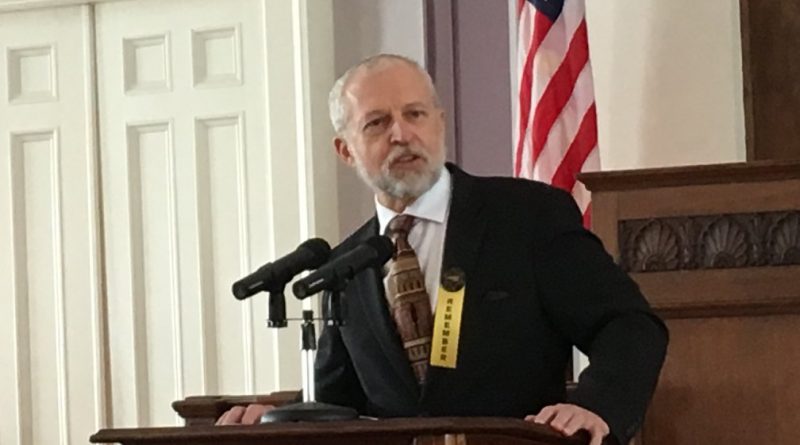Keynote Address at Alabama State Holocaust Commemoration, April 10, 2018
On Tuesday, April 10, 2018, I had the honor of delivering the Keynote Address at the State of Alabama’s Holocaust Commemoration in the State Capitol. The event was in the old Senate Chambers, the very same room where the Alabama Senate had voted to secede from the Union in 1861. Governor Kay Ivey was in attendance, and read a proclamation and honored our survivors; most of the ones present yesterday were from my congregation. My remarks follow:
Pretty much anyone who’s Jewish either lost family members in the Holocaust, or they know someone who lost family members in the Holocaust.
On my paternal grandmother’s side of the family we lost some cousins, Grossbards, who were from Antwerp, Belgium. They were murdered in Auschwitz. Family legend is they were in the diamond business, and there’s a stash of diamonds buried somewhere in Antwerp.
The Holocaust – or Shoah as we call it in Hebrew, a word that means “catastrophe” – was by far the greatest disaster to ever befall the Jewish people, and we are a people who have known many, many disasters over our 3,000 plus year history.
Megillat HaShoah – the Scroll of the Holocaust, telling of the story of the Shoah in a form similar to the book of Lamentations – opens with a description of how through centuries of exile “the monster of Jew hatred” would arise again and again. The description continues:
What befell the people Israel in Nazi Europe, however, is beyond classification, and what confronted its sons and daughters defies description. Untold numbers were forced out of their homes, torn from their families, trampled in the dust, worked to death. Six million created in the divine image were strangled, cremated, shot, buried alive; they died of starvation, of thirst, and of the cold. This time the monster stretched open its mouth beyond bounds, with a blood-curdling shriek and with stinking breath, and sought to eradicate everything.
6 million Jews – 1.5 million of them children – were murdered, one out of every three Jews then alive. Many countries in Europe lost more than 90% of their Jewish population in the Shoah.
Our brains can’t really digest statistics like that. It’s hard to process. Numbers fail to convey the horrors of what the Nazis did to us in those days. To try to understand what it’s like one has to speak with survivors, hear their testimony, or read their memoirs. And when you do, all you can do is cry and shake your head and wonder how is it possible that people could be so unspeakably cruel.
People of faith struggle with how to make sense out of the Holocaust. If God is kind, God is just, God is compassionate, how could He have allowed such horrors to continue for so long?
For many people, God died in the Shoah. In 1944 Elie Wiesel was 15 years old, living in the town of Sighet, then part of Hungary. He was a religious young man, who spent his days studying the Talmud, the dense corpus of rabbinic law and legend that requires expertise in both Hebrew and Aramaic, and at night he studied Kabbalah, Jewish Mysticism. And then the Nazis came, he was shipped off to Auschwitz with his family, and his faith fled in the flames of the crematorium. In his memoir, Night, he describes that first night in the death camp:
NEVER SHALL I FORGET that night, the first night in camp, that turned my life into one long night seven times sealed. Never shall I forget that smoke. Never shall I forget the small faces of the children whose bodies I saw transformed into smoke under a silent sky. Never shall I forget those flames that consumed my faith forever. Never shall I forget the nocturnal silence that deprived me for all eternity of the desire to live. Never shall I forget those moments that murdered my God and my soul and turned my dreams to ashes. Never shall I forget those things, even were I condemned to live as long as God Himself. Never.
Elie Wiesel’s God was murdered in the Holocaust.
Rabbi Richard Rubenstein said that it’s not that God died in the Holocaust—it’s our conception of God, our way of understanding God, our picture of God as benign and just, that died in the Holocaust. For Rubenstein, our notion that we are the Chosen People of a personal deity doesn’t make sense anymore. It’s not logical to cling to that belief in the face of overwhelming evidence to the contrary.
Rabbi Harold Kushner refuses to give up on the idea of God as just and kind; instead he gives up on the idea of God as all-powerful, as omnipotent. Kushner said:
Where did we ever get the notion that worshiping power was the greatest compliment we could play to God? Why is power the most admirable virtue? If I, walking through the wards of a hospital, have to face the fact that either God is allpowerful but not kind, or thoroughly kind and loving but not totally powerful, I would rather compromise God’s power and affirm his love.
Interestingly enough, a survey of survivors shows that most did NOT react the way that Elie Wiesel did, or that Rubinstein claims is “logical.” Three out of four Holocaust survivors who believed in a personal God before the Shoah, still believed in a personal God after they were liberated. But only 9% said that the Holocaust was somehow the will of God, part of a divine plan. Most either said it’s not for us to judge God, or that we can’t blame God for the way man uses his free will.
So if God didn’t die in the Shoah, where was God?
Some say that God was right there in Hell with us. The prophet Isaiah proclaimed m’lo kol ha’aretz k’vodo, the whole world is full of His Glory. Rebbe Nachman of Bretslav, a great Chasidic rebbe of the early 19th century said that God is found everywhere, even in the depths of the pit. Survivors tell me they have trouble with this as a response to the question of where was God in the Shoah. The problem many survivors have is they felt abandoned during those dark hours. If God was there, He was thoroughly hiding.
The philosopher Emil Fackenheim answers the question differently. For Fackenheim, the State of Israel is collectively what every survivor is individually: “a No to the demons of Auschwitz, a Yes to Jewish survival and security.” Fackenheim formulated the famous “614th commandment.” “Jews are forbidden to give Hitler posthumous victories” — we are forbidden to despair of the God of Israel, lest Judaism perish. For Fackenheim, regardless of where God may have been, we are not allowed to give up on God.
Fackenheim’s approach is reflected in a famous story that’s told of a time when God was put on trial in Auschwitz. God was charged with breaking the covenant He had made with the Jewish people. The beit din, the rabbinic court, heard the evidence, and found God guilty. And no sooner had the court rendered its verdict than someone called out “Mincha!” meaning it’s time for the afternoon prayer, and the men stood up and prayed. Even though God was guilty of failing to uphold his end of the covenant, they still did not give up on God.
The Israeli government itself has connected the Shoah and the founding of the State. In the decision of the Knesset, the Israeli Parliament, to establish the 27th of Nisan on the Jewish calendar as “The Day of the Shoah and Ghetto Revolt Remembrance Day,” Mordecai Norouk, in the name of the House Committee of the Knesset said “perhaps by the merit of their blood spilled like water, we achieved a state and the beginning of redemption.”
But tying together the Holocaust and the State of Israel—with the implication of suffering and reward—is also unsatisfying on many levels. Who asked the six million—who asked us?—if it was worth the price?
Ultimately, we cannot ever answer the question of where was God in the Holocaust. All we can do is to continue to struggle with the question—to wrestle with God.
Yom HaShoah needs to be more than just a time for remembering and honoring our dead and grappling with theological questions. It needs to be a time to remind ourselves and the world of the need to have a conscience. Hitler succeeded because millions of Germans accepted his demands for blind obedience. Goerring said “I have no personal conscience; Adolf Hitler is my only conscience.” If fewer Germans had relied on Hitler to be their conscience, there would have been no Shoah. One of my teachers from rabbinical school, Dr. Zev Garber, says “The message of the Shoah for the generation after and for future generations is not survival alone. There is something more important than survival, and that is preventing moral bankruptcy.” As long as children anywhere in the world are being taught to be morally bankrupt, to blindly follow demagogues into the cesspool of hate, our children’s and grandchildren’s future is not secure.
We must teach our children to make the right decisions even when in difficult circumstances. In his book Man’s Search for Meaning, Victor Frankl said,
In the concentration camps, for example, in this living laboratory and on this testing ground, we watched and witnessed some of our comrades behave like swine while others behaved like saints. Man has both potentialities within himself; which one is actualized depends on decisions but not on conditions.
We must teach the children of the world that there are no excuses for evil. You can’t blame it on the leaders or society – or claim that our enemies force us to make evil choices. Each individual decides where he or she stands in the struggle between good and evil. And the stakes are frighteningly high. As Frankl put it, “Since Auschwitz we know what man is capable of. And since Hiroshima we know what is at stake.”
Today we remember those who perished. Megillat HaShoah says “For these do I weep, for infants who never learned to say “Mommy,” for boys and girls whose youth was stolen from them, who withered before coming to blossom; for young men and women who never were blessed beneath the wedding canopy, for the elderly denied the privilege of a gracious old age; for the orchestras and the music, and for all the world’s beauty whose rainbow of colors was lost, replaced by only brown and gray and black. For all these do I weep.”
May God bring comfort to the souls of those who perished in the Holocaust and their families, and may God strengthen us in our efforts to prevent this kind of madness, in which people are killed simply for who they are or what they believe,
Amen.


